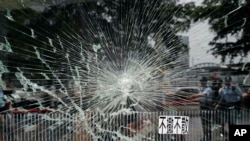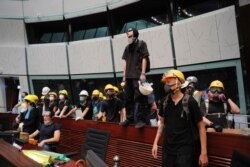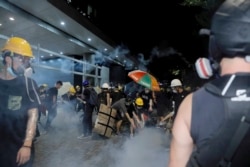A day after dozens of protesters stormed Hong Kong's legislative building, damaging and defacing the chambers, anger over the incident threatened to further divide the city's massive and largely peaceful protest movement that came together in spring to fight legislation that many fear could threaten residents' legal rights.
After an estimated half-million people joined an annual march promoting democracy, dozens of people hacked through the thick glass of government building and stormed the premises. Masked protesters spray-painted anti-government graffiti on walls and broke computers. They left just after midnight, as riot police fired tear gas to disperse thousands of people from nearby roads.
Carrie Lam, the chief executive of the Chinese territory, said at a pre-dawn press conference that residents were shocked and saddened by the "extreme use of violence and vandalism by protesters who stormed into the Legislative Council."
The Chinese government's Hong Kong and Macau Affairs Office described the protesters' action as a direct attack on the "one country, two systems" principle that allows Hong Kong freedom as a special territory in the Communist-party state. A spokesman for China's Foreign Ministry called the storming of the legislative council complex, known as LegCo, an unlawful act that trampled on the city's rule of law.
Democracy advocates, fearful that the movement could splinter and weaken, urged residents to support people whose views and tactics might differ from their own.
Organizers of the the annual march, the Civil Human Rights Front, asked the public to try to understand the frustrations of some people, mostly young residents who are furious with the government's indifference to their pleas. "We can have different views on these actions, but we urge you all not to blame [protesters] and not to distance yourselves" from them.
U.S. President Donald Trump expressed sympathy for the protesters' plight. "Well, they're looking for democracy and I think most people want democracy," Trump told reporters at the White House. "Unfortunately, some governments don't want democracy." Even before Hong Kong was handed from Britain to China in 1997, activists have sought the right for city residents to elect their chief executive, without Beijing's interference, a request repeatedly denied.
Police Commissioner Lo Wai-chung defended police action during the press conference and voiced disagreement with a reporter who questioned why protesters were given so much time to burst through multiple doors and windows with stanchions and metal poles. Lo said officers were inside the legislative complex for nearly eight hours, but did not restrain the protesters because some had tampered with the lighting and set off smoke bombs.
"My officers had no choice but to temporarily retreat, to do a regrouping and to do some redeployment to take back LegCo later on," he told reporters.
Lo did not say why police failed to restrain the intruders by using battery-powered lights and wearing gas masks.
For one month, massive crowds in the Chinese territory have protested, picketed, and besieged foreign governments to help them fight proposed changes to a fugitive ordinance that would allow Hong Kong to send criminal suspects to countries not currently covered by current law. The bill, pushed hard by Lam, would for the first time, permit fugitives to be extradited to mainland China for trial, even though Chinese courts do not guarantee rights enjoyed in Hong Kong.
Young protesters especially have grown increasingly agitated with Lam's government since June 9. After an estimated one million people marched to demand that the extradition bill be killed, crowds tried to stop voting on the measure by blocking traffic around the legislative center on June 12. Police suppressed participants with batons, pepper spray, tear gas, rubber bullets and bean bag rounds, causing serious injuries.
International rights watchers have said that the officers' decisions to beat and shoot protesters violated human rights norms. When Lam did not apologize or shelve the bill, an estimated 2 million people marched in a city of more than 7 million.
Participants also are demanding that Lam appoint an independent group to investigate police tactics, retract the government's description of the June 12 event as a riot, and drop charges against those arrested. Some residents say Lam has been so weakened that she must resign.
Young people have besieged police headquarters twice and blocked access to the tax and immigration departments. They have repeatedly occupied Harcourt Road, a central highway. No matter what, Lam has refused to talk or concede. The government's Independent Police Complaints Council said on Tuesday that it would undertake a detailed study of recent massive clashes and Lam has asked that the work be done in six months. Residents have dismissed the government's ability to investigate the violence with any objectivity or rigor.
Lam has been vilified by members of the public and their insistence that she respond to their demands: kill the ordinance, retract the police label on a protest as a riot, release protesters who were arrested at one mass gathering, and order an independent inquiry into the clashes that day. Weeks back, when young people — including secondary students in their uniforms — marched to her office seeking an audience, she refused to send an intermediary.
Lawmakers asked to meet with her while the legislature was under attack. An aide told them she was "too busy," according to a pro-democracy legislator.







